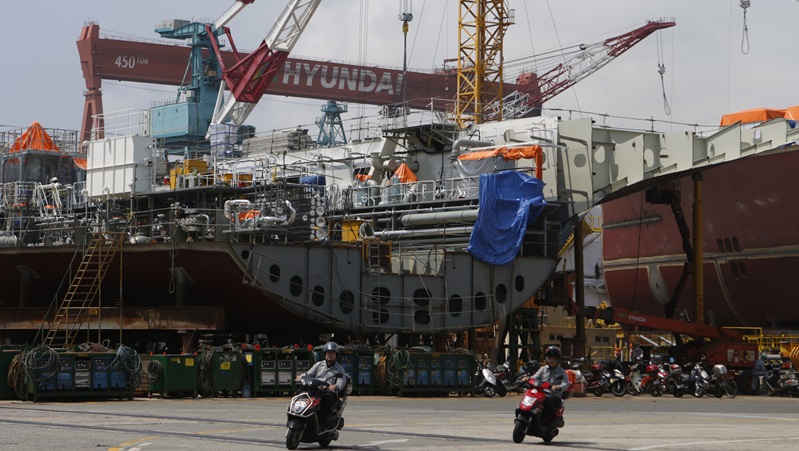The EU, UK and Canada wanted fellow OECD members to commit to stop supporting foreign fossil fuels before Donald Trump takes over as US president
A push to get rich nations to end their export credit support for overseas oil and gas projects has failed, after opposition from South Korea and Türkiye – and only late and lukewarm support from the United States.
The European Union, UK, Canada and Norway have been trying to get the 38 countries in the Organisation for Economic Co-Operation and Development (OECD) to agree to expand a 2021 ban on support for coal to the other planet-heating fossil fuels – oil and gas.
But South Korea and Türkiye opposed this effort, according to a document released by a South Korean government agency and seen by Climate Home. With pro-fossil fuel Donald Trump becoming US president on January 20, campaigners following the OECD talks said negotiators had given up trying to reach a deal.
An OECD spokesperson confirmed on Tuesday that governments had been “unable to reach an agreement to further restrict the provision of support for fossil-fuel related projects”, although “this issue may be revisited in the future”. Talks will continue in March but, because of Trump’s election as the incoming US leader, expectations of a breakthrough are low.
Missed chance
Climate campaigners lamented the lack of progress by OECD countries before Trump takes office. Kate DeAngelis, deputy director of international finance at Friends of the Earth US, said she had been “pretty hopeful that they were going to reach a deal” but “in the end, they failed”.
Dongjae Oh, gas lead at Korean campaign group Solutions for Our Climate, told Climate Home that “given the change in US administration, the 2024 momentum was a key moment for positive change – and it has been deeply regrettable to see talks stall, even with the majority of countries supporting the fossil fuel-finance restrictions”.
According to analysis from Oil Change International, the export credit agencies of OECD governments provide about $40 billion in support to foreign fossil fuel projects every year, with the vast majority going to oil and gas projects.
For example, before it promised to end support for fossil fuels in 2021, the UK’s export credit agency provided $300 million in loans to British companies working on a project to extract gas in Mozambique.
A joint UK-Canadian proposal and a separate one from the European Union would have committed governments – with some exceptions – to end their support for foreign projects that produce, transport, store, refine or distribute fossil fuels.
Opponents revealed
These OECD negotiations take place in secret, with no journalists or observers allowed to attend. But the Korean Trade Insurance Corporation (K-SURE) was present at the negotiations in March and June 2024. The organisation wrote up a summary of the talks and countries’ positions, which was released to a member of the Korean National Assembly – and an English translation has been seen by Climate Home.
It said that South Korea, Australia and Türkiye were opposed to the export credit proposals while the US, Japan and Switzerland were “reserved”.
According to K-SURE, South Korea argued that the ban would unfairly affect developing countries which are not members of the OECD and said there is a need to consider the pace of the green transition.
Record-hot 2024 shows world must adapt to extremes, says EU climate service
Türkiye said that fossil fuels should be reduced only gradually, without disrupting energy supply chains and energy security, and Australia said it was “unable to accept the current proposal”.
In March, according to K-SURE, the US argued that options other than a blanket ban should be considered, while Japan pushed for more exceptions and Switzerland wanted additional time for discussions between Swiss ministries.
In June, K-SURE reported that most countries other than South Korea and Türkiye agreed on the “fundamental direction” of the ban but differences remained on the details.
“South Korea conveyed its dissenting opinion,” K-SURE noted, while Türkiye said the proposal was “not feasible” because of national and energy security.
Trump deadline
The talks continued – and, according to DeAngelis, intensified after the election of Donald Trump on November 5 last year “put a fire under
Read More

